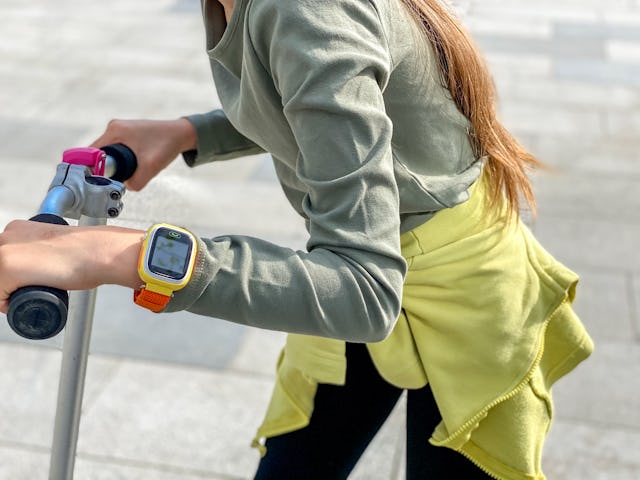Not A Fan Of AirTags? Here Are 5 Other Ways To Track Your Child’s Location
AirTags aren’t even designed to keep tabs on people and pets, FWIW.

Tracking your kid might seem like an invasion of privacy as they get older, but it's a surefire way to let you know they're safe — from the early wandering freedom of toddlerhood until you feel you've reached that delicate threshold where keeping tabs on them any longer might hinder their actual freedom. Whether they're lost, visiting a place unfamiliar to you, or simply testing their limits, your concern for your child's safety is valid. But with so much static out there about AirTags (more on that in a minute), what other options are there for tracking your child if that feels like the right option for your family?
Every parent has felt the panic of losing their kid. Sometimes they've just slipped into the dark, secret confines of a clothing rack. Other times, they've wandered off at the park while you were lost in a quick conversation with another adult. They're so small and so quick that losing your child can happen fast. Most times, however, they're easy to find. The network of moms at a park always seems to know what kid belongs to which mom and can help locate a blonde-headed slide climber when they're hidden from your view. But what if they end up a little further away? What if you can't find them immediately?
Bigger kids come with their own challenges. From friends you don't trust to parents you don't know, your older kids are often with people you may just not feel easy about. Will the mom with three littles pay enough attention to your older kid and their bestie on a trip to the mall? Does that new family from school have the same neighborhood boundaries as your family?
So, how can you track your kid and know they're safe?
Why not AirTags?
For many people, AirTags are the answer. However, they come with their own limitations. For starters, Apple only really recommends tracking items with AirTags. When asked about using them to track children or pets, Apple’s Vice President of Worldwide iPhone Product Marketing, Kaiann Dance, emphasized to Fast Company that AirTags aren’t designed for that purpose.
Then there’s the matter of accessibility. Many parents don't have iPhones. Some don't even have phones at all. AirTags work on Bluetooth by connecting to other nearby iPhones to ping locations. That works well when your child slips through your fingers on a shopping trip or when they're at a friend's house down the street. It becomes less handy when they're on their own or out in nature.
Furthermore, when an AirTag connects to someone's Bluetooth, it notifies them. So much for sneaky tracking during an abduction. And although Apple claims the AirTag is designed to discourage unwanted tracking, some people swear that instances of misuse do exist.
How can you track your kid's location without AirTags?
Luckily, there are other options besides AirTags.
1. JioBit Kids GPS Tracker
JioBits might be more expensive, but they're far superior for kid tracking. They work on GPS instead of Bluetooth, thus emitting their own signal and not relying on someone else's phone to offer updates. That means that no matter where your kid is, you have reliable, discreet access to their location. As a bonus: It comes with a high level of encryption, so no one else will be able to use the tracker to find your child.
2. Tile
A Tile works similarly to an AirTag and isn't technically recommended for tracking humans. It can, however, get the job done in a pinch. Unlike AirTags, Tiles work with both Apple and Android phones, too. It also rings when you mark it as lost to help better locate whatever (or whomever) it's attached to.
3. GizmoWatch
GizmoWatches are great options for kids old enough to want a phone but still too young to actually have one. They require a wireless plan, which can make them more expensive. However, you can use the watch to track and communicate with your child. And unlike a regular smartphone, parents can choose who has access to communicate with the GizmoWatch and who the GizmoWatch can call.
4. AngelSense
AngelSense operates a bit like a JioBit; however, it comes with some pretty cool features designed to help kids with sensory issues. It can only be removed with a unique parent key, which means an "itchy" kid or nosy stranger won't be able to remove and lose the device. It also comes with an SOS button and the ability to call a parent and talk to them on speaker phone during problem interactions.
5. Apple Watch with Family Setup
If you’re a diehard Apple devotee, you might consider an Apple Watch with Family Setup. What does that mean? Parents can provision an Apple Watch for their kids to use — choosing what apps and services their child can use, enabling tracking, and setting restrictions on who they can call and text. Not surprisingly, though, this is one of the most expensive options on the list. In addition to an Apple Watch price tag, you must also shell out for cellular connectivity and a coordinating service plan through your carrier.